ʻHaunting and compassionateʼ OBSERVER
ʻTautly plotted, deeply involvingʼ
LAURA BARNETT

ʻHaunting and compassionateʼ OBSERVER
ʻTautly plotted, deeply involvingʼ
LAURA BARNETT
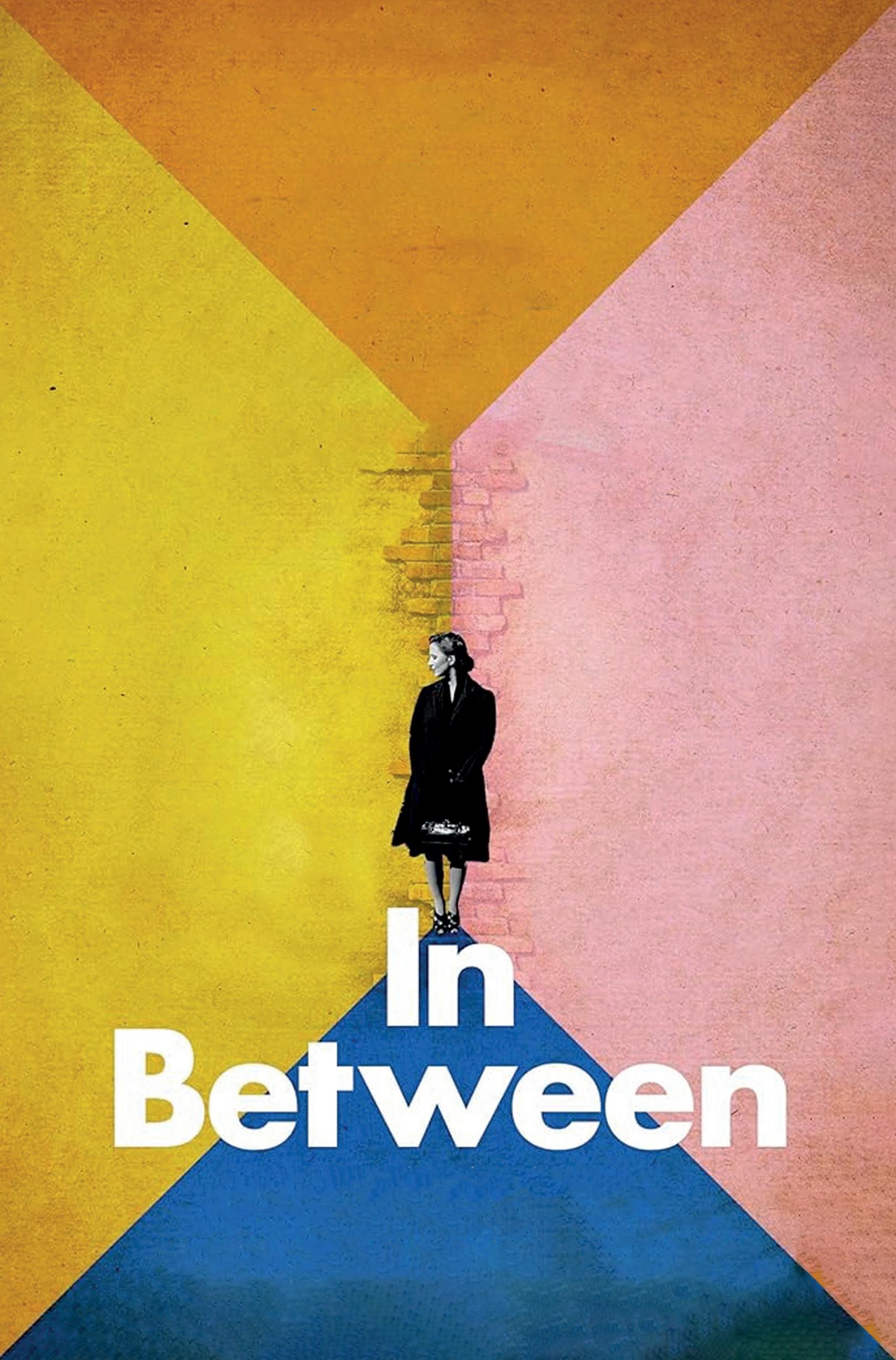
Berlin, 1961. The border closes.
Someone you love is on the other side . . .



JOSIE FERGUSON




‘A compelling debut . . . The Silence in Between is a haunting and compassionate account of war’s legacy, the atrocities inflicted on ordinary German women and their extraordinary resilience’ Observer
‘A strong, emotionally resonant debut full of music and menace’ Mail on Sunday
‘A hauntingly beautiful exploration of love, family and societal unrest all set against the backdrop of the Berlin Wall . . . a poignant and heartfelt story that eloquently captures the resilience of the human spirit’ Glamour
‘A confident debut with an original premise’ Sunday Times
‘A captivating, tense portrayal of desperation, fortitude and courage’ Herald
‘A quietly powerful novel about lives altered by a seismic historical moment’ Fife Today
‘A gut-wrenching but beautiful novel about love, family, resilience and music’ Culturefly
‘A powerful story of family, hope and generational narratives, beautifully told’ My Weekly
Born in Sweden, to a family of writers and readers, Josie Ferguson moved to Scotland when she was two. She returned to Sweden in her twenties, where she completed a vocational degree in Clinical Psychology (MSc). Upon graduating, she moved to London to pursue a career in publishing, something she had dreamed about since delving into fictional worlds as a child, hidden under the duvet with a torch.
She later moved to Asia in search of an adventure and a bit more sun. She currently works as a freelance book editor in Singapore, where she lives with her husband and two young children. While training to become a clinical psychologist, Josie learned about the complexity of human nature, something she explores as a writer. She believes books about the past can change the future and she aspires to write as many as possible. The Silence in Between is her debut.
Listen to music composed specially for this novel at josieferguson.com.
Josie Ferguson
PENGUIN BOOK S
transworld publishers
Penguin Random House, One Embassy Gardens, 8 Viaduct Gardens, London sw11 7bw
www.penguin.co.uk
Transworld is part of the Penguin Random House group of companies whose addresses can be found at global.penguinrandomhouse.com
First published in Great Britain in 2024 by Doubleday an imprint of Transworld Publishers Penguin paperback edition published 2025
Copyright © Josie Ferguson 2024
Josie Ferguson has asserted her right under the Copyright, Designs and Patents Act 1988 to be identified as the author of this work.
This book is a work of fiction and, except in the case of historical fact, any resemblance to actual persons, living or dead, is purely coincidental.
Every effort has been made to obtain the necessary permissions with reference to copyright material, both illustrative and quoted. We apologize for any omissions in this respect and will be pleased to make the appropriate acknowledgements in any future edition.
A CIP catalogue record for this book is available from the British Library.
isbn
9781804992739
Typeset in 10.81/14.12pt Minion Pro by Jouve (UK), Milton Keynes. Printed and bound in Great Britain by Clays Ltd, Elcograf S.p.A.
The authorized representative in the EEA is Penguin Random House Ireland, Morrison Chambers, 32 Nassau Street, Dublin d02 yh68.
Penguin Random House values and supports copyright. Copyright fuels creativity, encourages diverse voices, promotes freedom of expression and supports a vibrant culture. Thank you for purchasing an authorized edition of this book and for respecting intellectual property laws by not reproducing, scanning or distributing any part of it by any means without permission. You are supporting authors and enabling Penguin Random House to continue to publish books for everyone. No part of this book may be used or reproduced in any manner for the purpose of training artificial intelligence technologies or systems. In accordance with Article 4(3) of the DSM Directive 2019/790, Penguin Random House expressly reserves this work from the text and data mining exception.
Penguin Random House is committed to a sustainable future for our business, our readers and our planet. This book is made from Forest Stewardship Council® certified paper.
For those whose stories deserve to be heard
‘Those who cannot remember the past are condemned to repeat it.’
george santayana
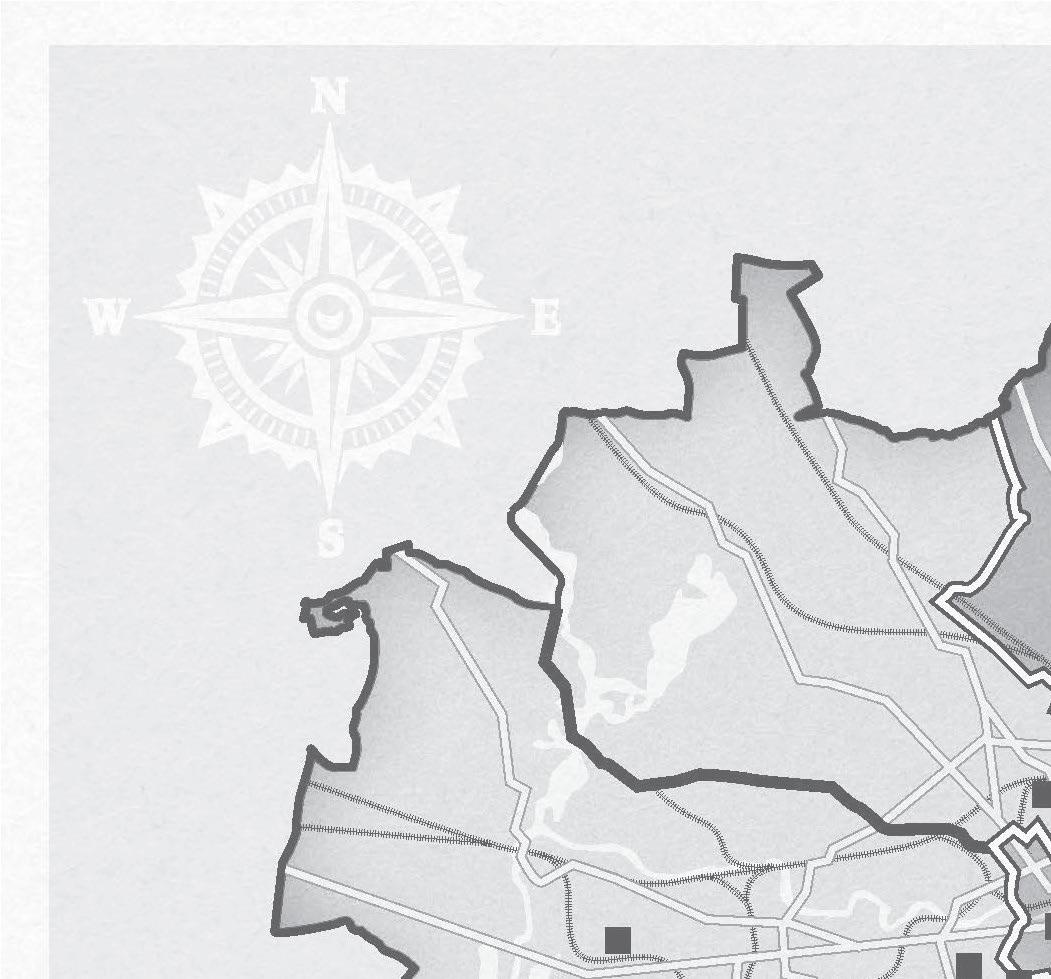
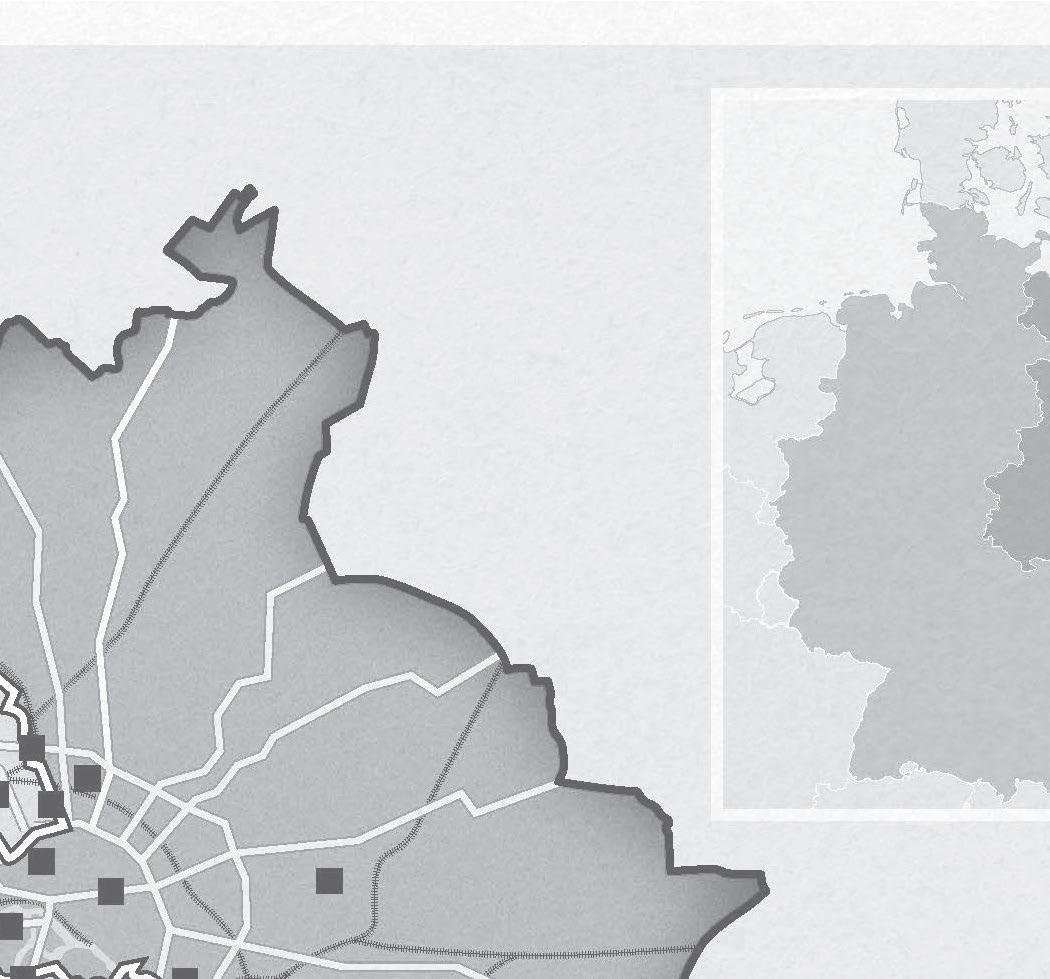
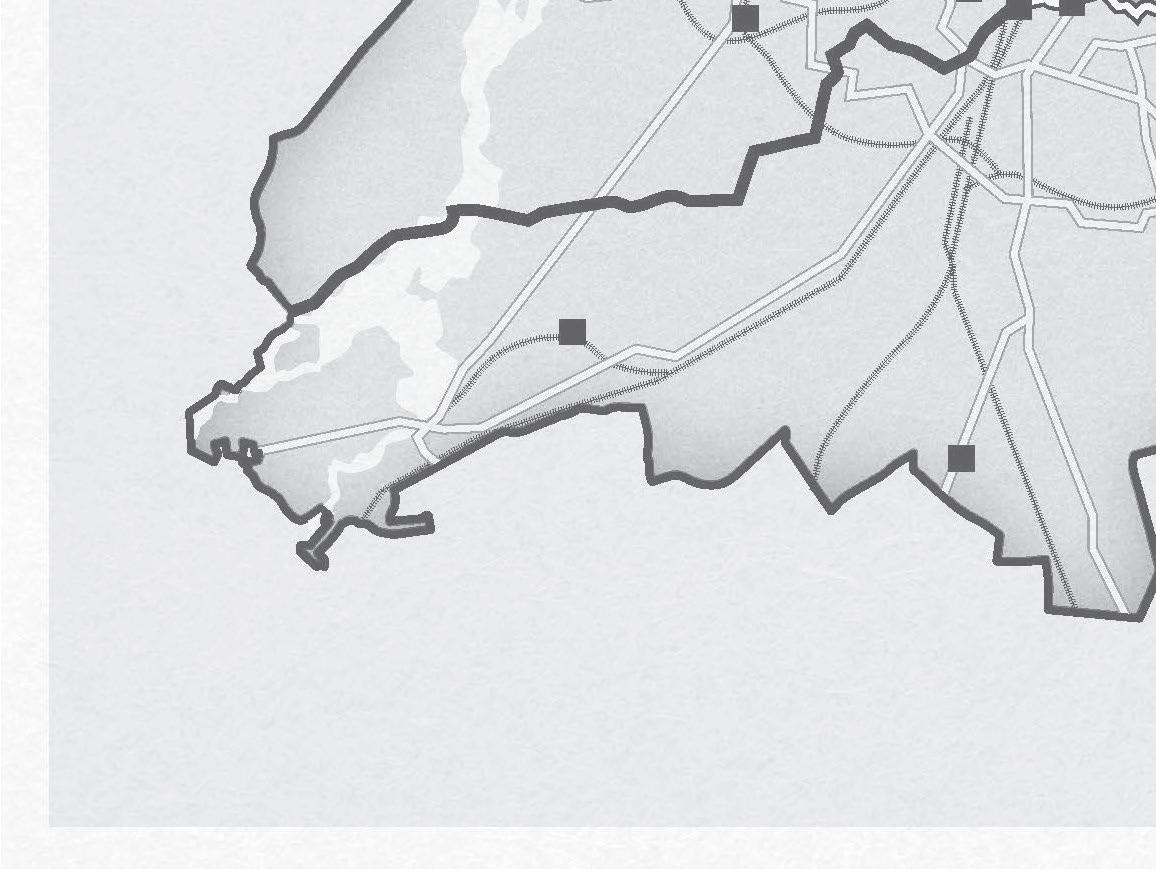
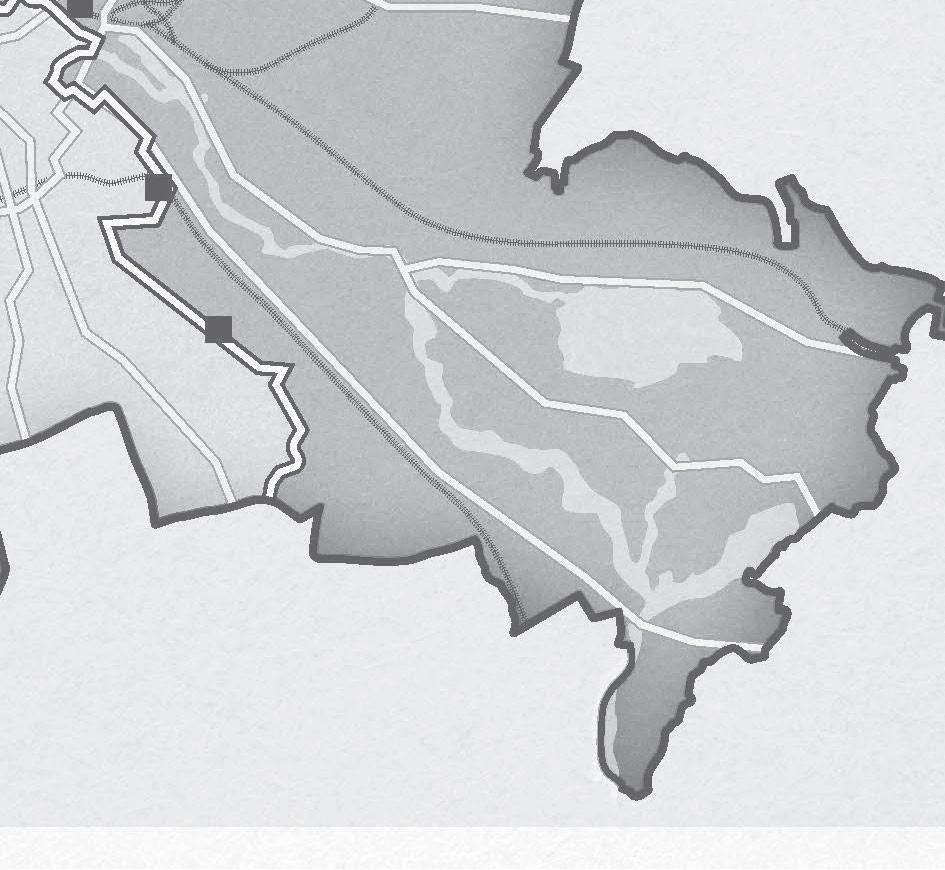

EAST GERMANY
Volkspark Friedrichshain
Berliner Dom
Berliner Dom
Soviet sector
Harzer Straße
Teltowkanal, Johannisthal
1 Bornholmer Straße checkpoint
1 Bornholmer Straße checkpoint
2 Prenzlauer Berg
3 Bernauer Straße

4 Lisette and Elly’s apartment
4 Lisette and Elly’s apartment
5 e Resi
6 Friedrichstraße station
6 Friedrichstraße station

Now – Berlin, 12 August 1961
Any parent who says they don’t have a favourite child is a liar. As Axel finally falls asleep in my arms, a bubble of milk resting on his upper lip, a tidal wave of love washes over me. I never had this with Elly. Not on the day she was born or on any day in the fifteen years since. Yet even the crippling guilt I feel at this fact is insignificant in comparison to this sensation swelling in my chest. What I feel for Axel is bigger than me, bigger than all of us. For a moment I let myself believe it is so big it will eclipse everything else, including the past and all that I’ve done.
I kiss his soft, feathery hair and stroke the red pinpricks in the crook of his arm where they’ve taken blood. He’s so little; he shouldn’t have already experienced pain. I clutch him a little closer and I vow to take care of him, to love him, to be better. I can’t fail at this again.
A man pushes the door open with his shoulder, his arms full of folders, a stethoscope around his neck. The rim of a Styrofoam cup is gripped between his teeth. He drops the folders on the cluttered desk and drains the last of his coffee before sitting down opposite me.
‘I’m sorry you’ve had to wait for so long,’ he says, opening one of the files and sifting through the papers. A single sheet escapes and flutters to the floor. He reaches down to grab it with a liverspeckled hand and bumps his head in the process.
‘Right, right, where were we?’ he says, rubbing his bald patch where I imagine a weal is already forming. ‘Yes, Frau Hartmann and Frank.’
‘Lange.’
‘What?’
‘Frau Lange. And Axel.’ I keep my voice to a whisper but the man doesn’t seem to notice that Axel is asleep in my arms, doesn’t understand it’s taken me hours to get him to stop crying.
‘Right, right. Let me just . . . yes, here they are.’ He extracts a page from one of the folders and holds it under the desk lamp, squinting at the handwriting.
Gently I shift Axel’s weight from one arm to the other and rub my gritty eyes. The room is blurry and the lamp seems to sway as if we’re on a ship. I can feel a dampness between my legs, the blood leaking out of me staining my skirt.
‘I’m afraid we’re going to need to run a few more tests,’ he says.
‘But we’ve been here for . . .’ I have no idea how long we’ve been here. From the fading light outside the window, I know the day is already dying, but I don’t know what time it is, or even what day.
‘We’ve a backlog, I’m afraid. But it doesn’t look as though we need to be too worried. I just want to do a few extra tests. Just to be sure.’
‘To be sure of what?’
‘That it’s not something more serious. Your baby’s oxygen level isn’t quite what we’d like it to be. You were right to bring him in. I suspect it might be to do with his heart.’
‘His heart?’
A sob heaves in my chest, taking us both by surprise. Axel stirs in his sleep and I jump to my feet so I can rock him once more.
‘Is he going to be OK?’ I can hear my voice crack. I clear my throat and try again. ‘He’s going to be OK, isn’t he?’
‘Oh, yes. I have no doubt. He’s – how old? Three weeks?’ ‘Five.’
‘Well, there you go. If it were something more serious, he wouldn’t have made it this far.’
I ignore the urge to push this man’s folders to the floor and stamp on them. Instead I start pacing in front of the window, rocking and jiggling, rocking and jiggling. The movement like a physical mantra.
‘Right,’ he says, shuffling his papers. ‘A nurse will collect Axel shortly. And perhaps you should go home and have a rest.’
I stop rocking. ‘And leave Axel here?’
‘Just for the night. Get some sleep, bathe, collect some things. Let your family know what’s going on.’
I turn and look him in the eye. ‘Absolutely not.’
‘You’ve been here for over forty-eight hours and your body is still recovering from childbirth.’ He looks pointedly at my skirt and my cheeks burn. ‘Axel will be absolutely fine.’
‘But I’m breastfeeding.’
‘We have formula. You’re an educated woman, Frau Lange. Very few women breastfeed these days.’
I clutch Axel tighter to my chest. ‘I just . . . I don’t think I can leave him.’
He glances at his watch and stifles a yawn. ‘It will only be a few hours. As I said, we need to check a few things, keep him in for observation. You can’t be with him until the morning anyway, as we don’t have a room free. And your son needs clean clothes. Nappies, too.’ He sniffs and raises one eyebrow. ‘He can’t very well wear that outfit another day.’
I finger the stained lapel of Axel’s blue pyjamas. It releases a faint sour smell of curdled milk. In my hurry to get him here, I hadn’t thought to bring an extra set of clothes. Heat rises up my neck in small, itchy welts. I’m failing again.
‘I’m not sure. It feels . . .’ I look down at Axel, his button nose, the frown that creases his forehead when he sleeps. His little fist is wrapped around my finger, his pink fingernails so delicate and small. I don’t want to be separated from him, but if we’re to be here for several more days, I will need to let my family know. My husband will be worried. Elly, too. And I should check on Mother. Not for the first time, frustration over the city’s severed phone lines boils inside me. There is no logic to it. Why have an open border but forbid us from speaking on the phone?
He sighs. ‘I’m a doctor, Frau Lange. I can guarantee Axel will be fine.’
I nuzzle my baby boy’s perfect little squashed face and feel the heat of his small body. ‘I live in the East . . .’ I begin.
‘As do I.’
‘What if I can’t get back?’
He waves a hand as if I’m a fly that needs swatting. ‘Of course you’ll be able to get back.’
He stands up and gathers his folders. I remind myself that this man is supposed to be the best. Better than any paediatrician in East Berlin, at least.
‘I’ll see you again tomorrow.’ His voice is firm. ‘We should know more by then.’ He turns to go but then stops. ‘He’ll be fine, your son. There really isn’t anything to worry about.’
And then he’s gone.
Outside, the sky has turned a deep purple and the day’s heat has retreated. Descending the hospital steps, I’m painfully conscious of my empty arms. Nothing about this feels right.
I look at my watch. I can be home in thirty minutes, back
here in two hours. My thoughts are a blur and I almost collide with a man bleeding from a deep cut on his forehead. His white fringe is stained red, and the left side of his face seems to be drooping as if it’s made of melted wax. He clings to a small, pale woman with fleshy lips and oversized teeth.
I sidestep out of the way and steady myself on the banister. As I slide my hand down it, I feel the sudden sharp stab of a splinter embedding itself in the soft flesh of my palm. On the bottom step, I pause and turn back to face the entrance. The couple has disappeared inside.
‘I’ll be quick,’ I whisper, as if Axel can hear me. ‘I’ll be back before you wake.’
I walk to the S-Bahn, stumbling a little on the badly lit pavement. With each step I take, I can feel the distance between Axel and me stretching like a taut rubber band.
I take a seat by the window in an empty carriage. Usually I love taking the S-Bahn across the city. Travelling from West to East Berlin is like moving back in time. Everything is more colourful in the West, the buildings are newer, the people happier. The moment the train crosses the border into the East, it’s as if a light has gone off. The buildings are drab and pockmarked with bullet holes from the war; people walk cautiously in their broken-soled shoes and unfashionable clothes. Even the smell is different: cheap coffee and cigarettes.
Today I don’t bother to look out of the window, I just rest my head on the vibrating glass and will my eyes to stay open. What I need is a piano so I can fold myself into its music, forget just for a moment that my baby is sick. But the music that once sat inside me was taken from me long ago and I will never get it back.
There are no spot checks on the train tonight – there usually aren’t on the way into East Berlin, just on the way out, when VoPos sift through passengers’ luggage to determine who’s
planning on ‘fleeing the Republic’. There has been more of this lately, a steady trickle that has turned into a flood. Perhaps it’s time to try again to persuade Mother to leave. For now, though, I just need to focus on Axel and getting him healthy.
As the train approaches my stop, the lights flicker and the engine groans. A group of teenage boys get on, their eyes glassy, a hint of whiskey on their breath. They don’t wait for me to get off first and I resist the urge to shoulder them out of the way.
When I get home the apartment is dark and the smell of bleach hangs in the air; Mother must have been on one of her cleaning binges. Her thunderous snores are now reverberating around the apartment. I can hear the sharp notes of Elly’s electronic keyboard, too, and if I had the energy I’d cross the hallway and tell her to have a bit more respect for the rest of the household. I touch my breasts; they are already hot and heavy. I know the hospital has formula, that it’s supposedly superior to what I have to offer, but if I hurry I can be back before Axel’s next feed. I find my husband asleep in our bed. When he’s not plagued by nightmares, he sleeps as Elly does, deeply and silently. I climb in beside him. He stirs but doesn’t wake. Beside me, the curtain flutters in the breeze, but the air is stagnant in here and our sheets are damp with sweat. He would want me to wake him, to let him know what’s going on, but I will write him a note instead. I don’t want to disturb him, not when he’s sleeping so soundly. Instead, I curl myself around him and press my face into his warm back. The earthy scent of his soap makes me feel at home. I close my eyes. Just for a moment.
I wake to threads of morning light seeping in through the crack between the curtains. My breasts feel like hot bags of sand
crushing my ribs. Instinctively I reach out to touch Axel’s back, to feel his chest’s slow rise and fall, but he’s not here. I kick off the sheets and look down at my deflated stomach as if I’ll find him still in there.
Axel. He’s in the hospital.
I look at my watch. It’s almost six a.m. I’ve slept for hours, not minutes.
‘Wake up,’ I say, shaking my husband’s shoulder.
‘Hmm?’ His eyes are still closed and he turns his back to me as if that will be enough to stop the conversation.
I start stuffing clothes into a holdall. ‘I had to leave Axel at the hospital.’ The moment I say the words, my throat burns. I didn’t have to do anything.
My husband sits up, rubbing his eyes and propping his pillow up behind him.
‘Is he OK? I’ve been so worried.’
‘He’s fine. They think. They just want to keep him under observation for a few more days. I came home last night to pack some things and then I was going to go back. I must have fallen asleep . . .’
‘You look tired. Why don’t you sleep some more and I can go to the hospital?’
‘No, I’ve slept now. Didn’t you hear me? He’s alone in the hospital.’ I pull a dress over my head. My hair snags in the zip but I yank it down, ripping several strands from my scalp. ‘I need to get back there.’
‘Lisette, breathe. You just said he’s fine. Let me get dressed, have some coffee and then we can go together.’
He untangles himself from the sheets, stretches, then ambles out of the room. He can never do anything quickly and I don’t want to wait for him to get ready. I rush to the bathroom and splash a handful of cold water on my face. I give my teeth a quick brush and then scan Axel’s cot for his teddy. He hasn’t
taken to it yet but maybe it will make the hospital feel more like home.
‘Lisette.’
I know something is wrong just from the way he says my name.
I find him in the living room, his face pale, his hand on the radio as if he’s trying to push the presenter’s voice back inside. He looks at me, and his eyes seem to be drowning.
‘The border,’ he says, his voice so quiet I can barely hear him. ‘They’ve closed the border.’
Now – Berlin, 13 August 1961
The unwritten music sits in my fingers tingling painfully. I need to release it but it exists only at the borders of my mind and I can’t quite grasp it. I screw up the song sheet into a ball and throw it at the window, poised to start afresh, when a scream pierces my fragile bubble of concentration, a feral wail that echoes around the room. Then there’s another scream, followed by a third. An entire orchestra of screams.
My body is still heavy with sleep and I stumble to the door, tripping on my mud-caked trainers.
Initially I think Mama must be hurt, but I don’t see any blood when I find her crumpled on the living-room floor. Another of her ‘moments’, I assume, but this screaming is new. Usually she just sits there staring at the corner of the room – at the space where her piano once stood. Other times, she fixes her gaze on the same spot on the far wall. There’s never anything there. But this screaming, that’s not something she’s done before.
Papa is kneeling beside her, his hands clasped together. His face is pale, his brow furrowed. The music I have assigned him – an overture with a steady, consistent drumbeat, reliable but
with a hint of sadness – has become an erratic hammering. Mama’s music is usually a storm – loud and angry, similar to the ‘Allegro molto’ in Shostakovich’s Eighth Quartet. Now it’s more like the whimpering of a dying animal.
Oma Rita stands in her nightgown a few feet away, her hand clamped over her mouth, her grey hair loose around her shoulders. I’ve rarely seen her hair down, free from the tight bun that usually holds it in place.
‘What’s going on?’ I ask.
Mama’s screams and sobs continue. Papa and Oma Rita seem to have been deafened by the noise. No one looks at me and the feeling of not being seen or heard is like a volcano inside me, ready to erupt.
‘Why is Mama screaming? Why is everyone crying? Can someone please just answer me? I’m standing right here.’ The room is so full of anguish I have an urge to jump out of the window just to get away from it all.
Mama closes her mouth and the screaming stops. The air becomes thin in the sudden silence. She lifts her finger. At first I don’t know what she’s pointing at.
But then Papa says, ‘Listen,’ and I do.
The voice on the radio crackles, static eating the man’s words. I recognize the presenter, but his voice sounds more highpitched than usual, as if he’s being strangled.
‘A fence . . . barbed wire? What’s he talking about? When did this happen?’
‘Elly, please, stop with the questions.’ Papa is still crouched down beside Mama. ‘There will be a way to cross,’ he says. But I can hear he doesn’t believe his own words.
‘Come, let’s go down,’ he says, gently touching Mama’s shoulder. ‘We’ll speak to them at the border. Explain.’
Mama won’t look at me. She simply howls once more and it’s then that I see the empty wooden cot in the bedroom beyond,
the crumpled sheet poking out through the bars. I finally understand the full horror of the situation.
‘Axel?’ My voice is a whisper.
Papa looks at me, his eyes strained. ‘He’s on the other side.’
The street heaves with bodies, pushing and shoving and panting their stinking morning breath on each other. A few cars sit in the middle of the road, the throng too dense for them to pass through. One man beeps his horn repeatedly but the sound is smothered by the crowd. The air is thick with anxiety but it could easily be excitement, too. If it weren’t for the stricken faces, the scene could be mistaken for a parade.
My armpits are damp, the bright morning sun competing with the heat of so many bodies. Everyone’s songs will change for ever with today’s news and, though I know it’s only my imagination that creates the sound of their music, I still find the cacophony of panic deafening. At fifteen I’m too old to hold Papa’s hand and yet I want to reach for it all the same.
There’s a crescendo of noise and a large woman shoves past me. Her hair is piled messily on top of her head and the pungent smell of her hairspray catches in my throat. I stumble on the cobbles and when I regain my balance, my parents are gone. The air leaves me and my skin turns so cold I begin to tremble. I want to resist the surge of people but if I fall I’ll be trampled beneath their feet. My fear grows bigger than my body, panic like a film over my eyes.
A hand grips my arm and I hear Papa’s voice beside me. ‘Your music,’ he says. ‘The music you hear that’s only yours. Find it.’
I nod and close my eyes. I stop resisting and instead am carried forward as if the crowd is a riptide. I will the beat of my song to soothe the swelling of my heart. It usually works but
today my tune becomes swallowed up by everyone else’s and the anxiety is still a shimmering mass at the edge of my vision.
‘OK?’ Papa says. Mama strides ahead, pushing people out of her way. Papa hesitates; he doesn’t want to abandon me but he won’t leave her either.
‘Better,’ I say.
We cross the street, Papa finding gaps for us to slip through. As we catch up with Mama, I turn to see Oma Rita watching us from our window. Even from this distance, I can see how her skin stretches painfully over her cheekbones, her eyes hollow and vacant. She’s probably the only woman in Berlin whose music will remain the same – a muddled melody that is almost hypnotic in its confusion.
‘Papa, we shouldn’t leave Oma Rita alone in the flat.’
He turns to look at me and blinks, his right eye slightly magnified by the thicker lens on that side of his glasses.
‘Are you still wearing your pyjamas?’ he asks.
‘What? Yes. I didn’t have time to change.’
‘Stay close,’ he says.
Ahead of us are fences, barbed wire lining the tops like jagged teeth. Soldiers stand stone-faced, trying not to engage with the hordes of people who are shouting at them, demanding answers and begging for passage.
We’ve come as far as we can, but Mama still tries to push her way to the front.
‘What are we going to do?’ I ask Papa, my voice faltering. ‘How are we going to get Axel back? It has to be temporary, don’t you think? Papa, you’re not listening . . .’
Someone tugs on my pyjama top. I look down to see a frail, hunched woman. Her scalp glimmers in the sunlight through her thinning hair.
‘I can’t see,’ she says. ‘Tell me what’s going on. What are they doing?’
‘There are soldiers,’ I say. ‘Lots of them. Some are standing guard with guns. Others are ripping up the street. It looks as though they’re piling up pieces of paving stones to form barricades.’
‘Let me through,’ Mama shouts. ‘Please. Please. I have to get through.’ And then she howls like a rabid dog. There are other people shouting too, but many are silent, standing motionless as they bear witness.
‘This way,’ Papa says. When Mama shakes her head and again tries to squeeze through the wall of bodies, he adds, ‘We’ll be able to see better from over there.’
We climb the steps of a nearby building. In front of us, there is a sea of bobbing heads. I reach out and touch Mama’s shoulder but she shrugs my hand away.
‘Where are the Western Allies?’ someone cries. It’s unclear whether he’s asking Papa or God. ‘Why aren’t they here? Why aren’t they stopping this?’
Finally, over on the Western side, a battered grey jeep appears. It pulls to a halt, whipping up a cloud of dust. Two uniformed men climb out wearing the distinctive red caps of the British military police. They stand at a safe distance from the border and we all watch them with bated breath. The older one, his body rigid, sucks on a cigarette, a deep frown marking his forehead. I imagine I can hear the pop of his jaw as he releases the smoke. The other man – younger and rounder, his belly stretching the fabric of his uniform – takes off his cap and twists it in his hands, bending it out of shape. Slowly he shakes his head and then they both turn away, bowing their heads to talk. I find myself straining forward as if somehow I might be able to catch the words passing between them, but all I can hear is my own uneven breath.
The older officer flicks his cigarette butt towards the border in a pathetic act of defiance, then they climb back into the truck,
slamming their doors in unison. The engine stutters to life and they drive off, leaving another flurry of dust in their wake.
‘Don’t they care?’ I ask. ‘Where are the Americans?’
‘They can’t do anything,’ Papa says quietly. ‘No one wants another war.’
Mama begins to wail once more. She rocks back and forth, hugging her chest as if Axel is there in her arms. Papa and I exchange a look. Neither of us knows what to do. This is not who she is. Mama doesn’t bend, she doesn’t break – not in this way, at least. Today I don’t even recognize her. I want to try to give her some comfort, reach out and take her hand, but I’m terrified she’ll look at me and wish it was me on the other side.
As morning slides into afternoon, some people give up and trudge home. But more keep coming. Mama shifts between bouts of sobbing followed by persistent efforts to push forward, mumbling jumbled, hysterical words. Eventually my parents and I inch closer to the barrier until we are a mere metre away.
Papa attempts to speak to a stocky guard. The man stands with his feet wide apart, spine straight, a gun strapped to his chest. Sweat trickles down a damp strand of hair poking out of his helmet.
‘Please listen,’ Papa says, his voice steady but pleading. ‘My son is in a hospital in the West. He’s just a baby, a few weeks old. He’s sick and his mother, my wife, came home last night just to wash, get a change of clothes, and then this . . . We need to cross, we need to get our son.’
The guard won’t even make eye contact. He just moves his hand up so one podgy finger rests on the trigger of his gun. Papa retreats, his shoulders stooped. I want to try as well but Mama holds me back with a furious frown.
When darkness has settled for the night, we finally head home. Mama can barely walk. I imagine her grief like a man sitting on her shoulders, his weight driving her into the ground. Papa half walks, half carries her, and I follow a few paces behind.
Inside the apartment, Oma Rita is asleep in her chair by the window. She’s snoring loudly, her head lolling to one side, a string of saliva stretching from her bottom lip to her chin.
‘We’ll try again tomorrow,’ Papa says, lowering Mama on to the sofa. ‘Once we’ve explained our situation, once they’ve organized a new visa system, everything will be OK.’
There are reminders of Axel everywhere – his small cot yawns empty; his play mat lies forlorn. He hasn’t been with us long and yet it feels like we’ve never existed without him. Mama looks up at Papa with a glazed expression, as if her soul has already left her. I go to the fridge and rummage around for something to eat. I take out yesterday’s stew and reheat it on the stove, ignoring the globules of fat it spits on to my pyjamas, then dole out small portions on four plates. It looks unappetizing but it smells of yesterday when everything was OK.
Behind me I hear Papa repeat, ‘It’ll be OK. I promise you. We’ll get Axel back.’
By the time I turn around, Papa is carrying Mama to bed, her long thin legs dangling over his forearm like a pair of empty tights. He comes back, closing the bedroom door gently behind him, then turns on the radio. The presenter’s disembodied voice floats around the room.
‘An “anti-fascist protection barrier”? Is that what they’re calling it?’ The volume of my voice rises with each word. ‘They’re not trying to keep the West out. Everyone knows that. They’re trying to keep us in!’
Papa simply nods and joins me at the table. He picks up a fork and starts separating the carrots from the stew, piling them on one side with the focus and precision of a surgeon.
A sudden loud snort breaks the silence. Oma jumps up from her seat, her hands clenched into fists, her eyes wild.
‘What was that? What’s going on?’
‘It’s nothing, Rita,’ Papa says, going over to her. ‘You were sleeping. Do you want some food? There’s some stew warmed up. And I’ve picked out the carrots for you.’
‘No, no stew. I need to sleep.’
‘OK. Come on, then.’ His hand hovers near the small of her back, not touching it but close enough to make her instinctively move away.
‘Where have you been? You left me alone.’ Her voice trembles. ‘I thought . . . when you didn’t come back . . . Have the bombs stopped falling?’
‘The war’s over, Rita. It was over a long time ago.’
‘Who are you? Where’s Ernst?’
‘You’re tired. Let’s get you to bed.’
She shakes her head and lets him guide her to her bedroom, but when she gets there she ducks inside quickly and slams the door, forcing Papa to take a step back. He stares at the closed door. Slowly he takes off his glasses and rubs the bridge of his nose.
‘Papa, what are we going to do?’
He comes over to me and kisses my hair. I lean into him, breathing in his faint woody aftershave. My heartbeat begins to slow, the tightness in my chest easing.
‘I don’t want you worrying about this, El. We’ll get Axel back. The borders won’t be closed for ever.’
‘Things have been so much better lately,’ I whisper. ‘With Mama.’
‘I know. But everything will be good again, I promise.’ He gives me a squeeze, then releases me gently. ‘See you in the morning.’
I should do the dishes or at least pile them in the sink, but the
very thought exhausts me. I clear the food away, though, scraping the leftovers into the rubbish bin, the gloopy stew sliding down the inside like a slug.
I trudge off to bed, not even bothering to change into clean pyjamas, but I can’t sleep. The mattress is lumpy, the air humid. I want to play my keyboard, let the sound of the music mute the day’s screaming chaos, but my limbs ache and I can’t seem to move.
Through the wall, I can hear someone in Axel’s room.
I force myself to get up. The lamp is off but the door to his room is ajar. I push it – the sound of a sigh in the night. Axel’s cot now sits by the window, moved here from my parents’ room. Moonlight shines down on to the empty mattress like a spotlight. The wardrobe is open and an avalanche of Axel’s clothes has spilled out on to the floor. In one corner is a pile of stuffed toys – some used to be mine, the fabric worn, stuffing poking out; others are soft and yet to be loved.
In the other corner is a slouched figure, head bowed.
‘Papa?’
He’s so close but I can barely hear his music; his drumbeat has become slow and quiet, like the weak pulse of someone gradually fading away. Clutched in one hand and pressed against his face is Axel’s teddy-bear sleepsuit. Papa’s shoulders shudder, but his sobs are silent.
9 November 1938
The night had already closed in and outside there was an icy wind that bit, but tonight nothing could ruin my mood. My hair was curled with a new hat pinned neatly atop it, and tucked into my purse were the Reichsmarks Mother had pressed into my hand as I left. I looked good – not beautiful, perhaps, but respectable and maybe, at a stretch, pretty. I walked along the tree-lined boulevards, my shoulders back. I didn’t have a job yet, but I was no longer a schoolgirl. Instead of watching the world, I was becoming a part of it.
I crossed the street, narrowly avoiding a tram trundling past. Ahead, our local Jewish hatmaker was closing his store. He looked at me oddly. I gave a little wave but he fumbled with his keys, his hands clearly shaking. Maybe he didn’t recognize me – I was no longer a child following Mother around while she did her shopping. Or perhaps the growing discrimination against the Jews had put him on edge. Lately Berlin had been twitching with a nervous energy. My friends Julius and Max said things were bound to get worse, but Father said everything would calm down eventually.
Gertrud was already at the club when I arrived, checking her reflection in a nearby shop window. She was always in search of a mirror, a window, the back of a spoon – anything that would confirm her immaculate appearance.
‘Lisette! It is so good to see you,’ she said, kissing the air in my vague direction. ‘And don’t you look beautiful as always.’ She said this same line every time we met and it niggled at me like a stray hair tickling my face.
‘Ruth and Karin are already waiting in the queue. Have you eaten?’
‘No, I—’
‘You have? Good, excellent. It’s best not to drink and dance on an empty stomach. Goodness, one would think on an evening as cold as tonight, the doors would simply be thrown open and we would all be rushed inside immediately. I suppose they may want to make sure only the right sort is admitted.’
‘I suppose,’ I said, but I wasn’t really listening; my eyes were on a group of young boys puffing on cigars, the smoke from their mouths curling up into the darkened sky.
‘Come now,’ Gertrud said. She pushed her way through the crowd, ignoring those who tutted. I followed dutifully, apologizing as I went, careful not to step on anyone’s toes. As I squeezed into the queue beside Karin and Ruth, the heel of my shoe momentarily caught in a crack in the pavement. I grabbed a man’s shoulder, more scared of falling and humiliating myself than adhering to social decorum.
‘Steady there,’ he said, holding my elbow as I freed my foot. I smiled and thanked him, but his attention was already on Karin.
‘You’re not hurt, are you, Lisette?’ Ruth said, greeting me with a kiss on both cheeks.
‘Lisette, I simply love what you’re wearing,’ Karin said. She gave me a dazzling but self-conscious smile – it was clear she knew people were watching her, captivated by her beauty.
The girls stamped their feet and blew into their gloved hands as we waited, but the excitement and my quiet anxiety kept me warm. As Gertrud dealt out gossip like a pack of cards, I searched for Julius’s face. Knowing he would be here somewhere made my heart beat a little faster.
It wasn’t long before Gertrud managed to persuade the doorman to let us in and we were ushered inside. Beyond the doors was a new world. The space was more extravagant than I’d imagined. The ceiling was made of reflective glass and mirrored globes hung down from it like diamonds. In the far corner, jets of water rose and fell to the sound of music, like a strange, otherworldly ballet. In another corner, there was a full-sized carousel, where fetching men and women rode ornate horses. It was early but the dance floor was already filling up. I longed to join the other revellers, to immerse myself in this new realm, but Gertrud was pulling me towards one of the tables. A group of men looked over at us. Ruth flicked her hair, Karin giggled uncontrollably and Gertrud frowned her disapproval.
‘Come now. We must sit,’ she said sternly. ‘It’s still early. Let us take our seats, have a look around, wait for someone to call us – each table has its own phone, you know – or perhaps someone might send us a note.’
‘A note?’
‘This,’ Gertrud declared, taking the seat beside me and gesturing to a curved, snake-like contraption, ‘is a pneumatic tube. If someone likes you, they can send you a message. And it’s not just messages you can receive,’ she continued, relishing our attention. She picked up a dark-red, leather-bound menu. ‘You can order presents, too.’
A waitress appeared, her short hair arranged in neat waves, her lips a red rose. Gertrud ordered brandy for us all and it appeared almost instantly, presented with a flourish on a gold tray. Karin sipped at hers, warming the glass in her hand, but
mine disappeared quickly, the subtle sweetness too much to resist. Gertrud ordered another round and while the other girls chatted, I took in the motorized glass dome above us, the revolving mirrored balls, feeling the music pulse through my veins. There was a jazz band playing and when the pianist took over in a spotlighted solo, my own fingers tapped out the song on my thighs. One day I hoped I’d have the confidence and the skill to be up there, playing with the best.
Karin received her first message, which appeared with a whooshing sound. Soon, I thought, soon it will be my turn. I waited patiently for the phone to ring or a message to arrive and shake me from the deep sleep of childhood. I was desperate to become an adult, and what defines you as an adult more than being desired as one? But the phone never rang for me and no message appeared, either.
‘Isn’t that Julius?’ Gertrud asked after we’d been sitting there for well over an hour, poking an elbow into my ribs and nodding towards the dance floor.
I found his face in the crowd. It took only moments for the flutter that was born in my chest to grow and consume me.
‘Yes, yes, it is,’ I said, jumping to my feet, holding my hat in place.
‘Goodness, Lisette, what are you doing?’ she said, gripping my arm. ‘Sit down. You like him, do you not? As more than a friend? In which case, you cannot simply bound over there like an oversized horse. Let him come to you.’
‘But . . . I’ve known him for ever.’ It felt wrong not to go over but I sat back down all the same. I didn’t know the rules, and if anyone knew them, it was Gertrud.
‘Right now, he sees you as a sister. You want him to start seeing you as a woman.’
‘But how do I make him see me as . . . a woman?’ I asked, a blush heating my cheeks.
‘You need to behave differently around him. Be more aloof, sophisticated.’
I nodded, resisting the urge to ask her what that would look like exactly. I needed her help but Gertrud was not someone to whom I wanted to be indebted.
‘Max is with him,’ she said, taking off her white silk gloves and folding them neatly in front of her. ‘They are as thick as thieves, those two. Look at them flirting with every woman in sight.’
I ignored the sharp pain in my chest, swallowed the hurt.
‘Maybe it’s best he and I just stay friends,’ I said quietly, but even saying the words pained me. I gulped down more brandy, found some strange respite in the way it burned my throat.
‘I heard Max is planning on becoming a doctor,’ Gertrud said. ‘I wonder if he would take a look at my knee.’
‘Your knee?’
‘Yes, it looks bigger than the other one. It’s quite odd. I really do need a professional to take a look . . .’
Karin returned from the bathroom, her lipstick reapplied, her hat pinned neatly in place. Before she reached our table, a man approached her and, after a short exchange, they headed for the dance floor. Meanwhile, Ruth was busy talking to someone on the phone that was attached to a pillar beside our table.
‘I am just going to powder my nose,’ Gertrud said, standing up and smoothing down her dress in the process. ‘You will be all right on your own?’
‘Of course.’ I buried my face in the menu as if it were the latest romance novel and I couldn’t keep my eyes off the page, but after a few minutes, my attention turned back to Julius, who was twirling one girl after another on the dance floor, his glasses threatening to slip off his nose. None of the girls kept his attention for long, though, and soon he was clambering up on to the carousel, pulling Max up with him. There was only one free